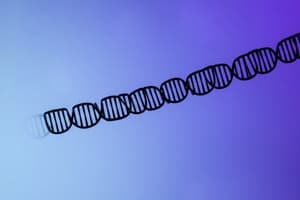Podcast
Questions and Answers
What are the differences between mitosis and meiosis?
What are the differences between mitosis and meiosis?
Mitosis results in two genetically identical daughter cells, while meiosis results in four genetically diverse daughter cells.
How do cell cycle checkpoints contribute to the regulation of the cell cycle?
How do cell cycle checkpoints contribute to the regulation of the cell cycle?
Cell cycle checkpoints ensure that the cell cycle progresses correctly and that the cell is prepared for the next stage. If the cell fails to pass a checkpoint, it will enter a state of cell cycle arrest, preventing it from proceeding to the next stage.
What are the consequences of dysregulation of the cell cycle machinery?
What are the consequences of dysregulation of the cell cycle machinery?
Dysregulation of the cell cycle machinery can lead to a variety of cellular events, including cell death, cell senescence, and cancer.
Flashcards are hidden until you start studying
Study Notes
Cell Biology: Understanding the Cell Cycle
Cell biology is a branch of science that studies the structure, function, and behavior of cells, which are the fundamental units of all living organisms. One of the most important aspects of cell biology is the study of the cell cycle, which is the series of events that occurs in a cell leading to its division and the creation of two daughter cells.
What is the Cell Cycle?
The cell cycle is a series of events that a cell goes through from its birth to its eventual death. These events are commonly divided into three main stages: interphase and mitosis. At the end of the cell cycle, the resulting cell is genetically identical to the parent cell, and the cell's DNA has been replicated.
Interphase
Interphase is the longest stage of the cell cycle, which occurs between two consecutive divisions (mitosis). During interphase, the cell grows, duplicates its organelles, and replicates its DNA. This process is called DNA replication, and it is crucial for the cell to have a complete set of chromosomes for the next phase of the cell cycle.
Mitosis
Mitosis is the stage of the cell cycle where the cell splits into two identical daughter cells. This process is divided into four main stages: prophase, metaphase, anaphase, and telophase. During prophase, the chromatin condenses into chromosomes, and the mitotic spindle begins to form. The chromosomes then line up at the middle of the cell during metaphase. In anaphase, the sister chromatids separate and move to opposite ends of the cell, and in telophase, the chromatin decondenses, the nuclear envelope reforms, and the cell begins to elongate.
Meiosis
Meiosis is a type of cell division that occurs in the development of sex cells, such as sperm and egg cells. Unlike mitosis, meiosis results in four genetically diverse daughter cells. Meiosis consists of two cell divisions, meiosis I and meiosis II. During meiosis I, homologous chromosomes pair up and separate, while in meiosis II, sister chromatids separate. The end result is four haploid daughter cells, each containing half the number of chromosomes as the original cell.
Cell Cycle Checkpoints
Cell cycle checkpoints are points in the cell cycle where the cell checks to ensure that certain conditions have been met before proceeding to the next stage. These checkpoints help to ensure that the cell cycle progresses correctly and that the cell is prepared for the next stage. If the cell fails to pass a checkpoint, it will enter a state of cell cycle arrest, preventing it from proceeding to the next stage.
Regulation of the Cell Cycle
The cell cycle is regulated by a complex network of proteins and signaling pathways. These regulatory systems, known as the cell cycle machinery, control the progression of the cell cycle and ensure that it occurs correctly. Dysregulation of the cell cycle machinery can lead to a variety of cellular events, including cell death, cell senescence, and cancer.
In conclusion, the cell cycle is a critical process that occurs in all living cells, involving the replication of DNA and the division of the cell into two daughter cells. Understanding the cell cycle is essential for comprehending the fundamental processes of cell biology and the growth and development of all organisms.
Studying That Suits You
Use AI to generate personalized quizzes and flashcards to suit your learning preferences.




